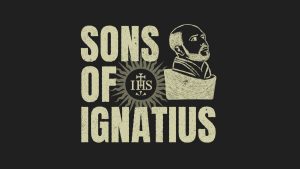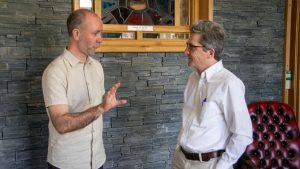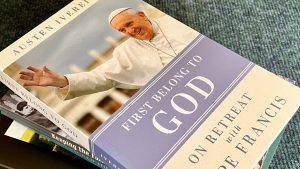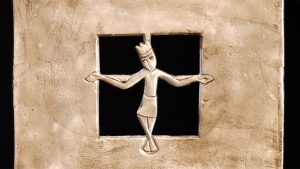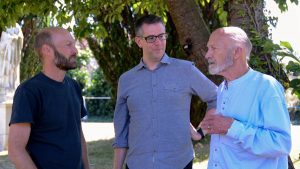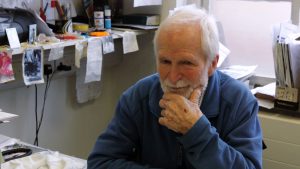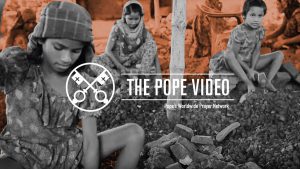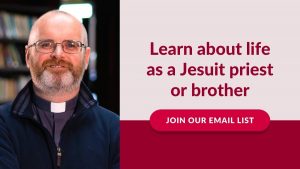Remembering James McPolin SJ
 In his homily at the funeral of James McPolin SJ, Michael O’Sullivan recalls a life dedicated to faith and justice in El Salvador, in Malawi and here in Ireland. He also remembers Jimmy as a dedicated and innovative president of the Milltown Institute.
In his homily at the funeral of James McPolin SJ, Michael O’Sullivan recalls a life dedicated to faith and justice in El Salvador, in Malawi and here in Ireland. He also remembers Jimmy as a dedicated and innovative president of the Milltown Institute.
About two years ago Jimmy said to me that he felt most alive and of most use during the years he was in El Salvador (1989-96) – despite the awful suffering among the people and the deadly danger that shadowed his own life. He went there straight after his term as President of Milltown Institute (1983-89). He did so because of his commitment to and companionship with the God whose love makes the promotion of justice an absolute requirement.
Jimmy had hardly arrived in the country when six Jesuits, a woman (Elba Julia) and her daughter (Celina), were murdered by an army death squad at the Jesuit residence on the grounds of the University of San Salvador. The Jesuits were murdered because of their commitment to the faith that does justice; the women, who had taken refuge with the Jesuits after their home had been damaged by gunfire, were killed so as to leave no witnesses. Jimmy could have been among the dead that night, 16 November 1989, given that he had deferred accepting an invitation to stay with the Jesuit community at the University until he had spent more time among the ordinary people. (2) Afterwards his concern to see justice done in the case of his dead Jesuit companions and the two women was viewed by him as a way also of promoting justice for the people of the country. In a letter to members of his family in Ireland in 1990 he wrote: “The future of justice is obfuscated by the fact that the trial of the soldiers for the killings is being impeded by false evidence of the military and by the collusion of the American Embassy and Government.” (3)
You may be aware of the memorial bell on the Milltown avenue in front of the Irish School of Ecumenics building. It was put up in honour of those who were killed that night. One of the dead Jesuits, Amando Lopez, had studied theology at Milltown, and was ordained to the priesthood in this chapel. You can see him in the 1965 ordination photo on the corridor outside this chapel. Another of the dead Jesuits, Ignacio Ellacuria, had done part of his Jesuit formation in Dublin as an ordained priest. The memorial bell will also always be a reminder of the third president of the Institute and the values that took him to El Salvador at that time.
Jimmy also narrowly escaped death at a subsequent date when he found himself under the table while army bullets were sprayed around the room. He was the pastor of San Antonio Abad parish, where a predecessor, and several young people on retreat, had been slain by the army in 1979. I stayed with Jimmy and the Jesuit community at San Antonio Abad during part of my time in El Salvador in 1991 and 1992. One day he asked if I would like to see the new houses he was having built for the poor. We headed toward a four wheel drive vehicle. Remembering that Jimmy did not drive in Ireland, and knowing I did not feel like handling such a large vehicle there and then in San Salvador, I asked him who would be our driver. He told me he would drive. He proved to be a very able driver, having become such out of his desire to serve the poor more effectively.
To understand the development of Jimmy’s commitment to economically poor and politically persecuted people it is necessary to know that in 1974-75 the Jesuits worldwide committed themselves to the work of justice as integral to the service of faith and that Jimmy was one of two Jesuits elected by his Irish colleagues to represent them in Rome where that decision was taken. Then in 1980 I asked him as a leading scripture scholar to review a book that was generating a lot of interest at the time, namely, Jose Miranda’s Marx and the Bible. (4) He told me later that reviewing this book led to a quantum leap in his Jesuit commitment to what had been decided in Rome some years earlier. Viewed from the perspective of spirituality as an academic discipline it can be said that his quantum leap of faith was facilitated by the practice of an intense reading experience. Other kinds of practices would evoke, express and enhance his conversion.
In that year, 1980-81, some of us here at the Institute – students at the time – thought the Institute should take an initiative to stop the intended tour of apartheid South Africa by the Irish rugby team. We held an all night vigil at the premises of the IRFU and collaborated with others in organising and taking part in protest marches on the streets. Jimmy, who was the Dean of Theology at the time, was one of very few academic and administration staff to join us. He also went on a placement to Brixton, England, around that time to work with marginalised black people. This commitment to black people reappeared strongly after his years in El Salvador when he went to live and work in Malawi (1997-99). One of his former Malawian students told me that Jimmy was a friend of the poor and oppressed, and that he lived what he taught from the Bible. This was also true of him in Ireland.
During his years as President of Milltown Institute he accepted an invitation from Seamus Murphy, now a member of the Philosophy Faculty, to live in inner city Dublin as a member of the Jesuit community called after Luis Espinal. Espinal was a Catalan Jesuit who had been murdered in Bolivia for his commitment to the faith that does justice. The Espinal community, which had been brought into being in 1980, the year of Espinal’s martyrdom, by Seamus, Kevin O’Higgins, the former Dean of Philosophy, and myself, when we were students at Milltown, and which was joined almost immediately by John Moore, then a Professor and Head of Department at UCD, was committed to simple living, was a friend to the flat dwellers in the local Dublin Corporation estates, and was a meeting place for social action groups. Jimmy used to cycle to and from Milltown in those years. He also participated regularly in protests outside the U.S. embassy against U.S. foreign policy in Central America, protests in which some staff and students at the Institute took a prominent part.
In line with how he understood and lived his faith and scholarship a defining characteristic of his Presidency was the way he enabled the teaching of liberation and feminist theologies to progress in the Institute. He welcomed me on the staff in 1986 and I am grateful to him for the support he gave me to teach these theologies. Una Agnew, the first female head of a programme at the Institute, and now Head of the Dept. of Spirituality, remembers his commitment to improving the situation of women, while Dominique Horgan, now the Archivist, remembers how he initiated the Adult Religious Education programmes, of which she was the first Director. This commitment to adult religious education is also reflected in the fact that during his years as President he taught scripture at the People’s College, which was located near the Espinal community. He did so there in order to reach out to people who at that time would not come to places like Milltown because of their social class, feelings about the Catholic Church, or educational attainment. Jimmy was a great success with such groups.
After his years in Malawi, following his term as President of the Institute, and his years in El Salvador, Jimmy went to Belfast to be in solidarity with those struggling for peace and justice there. During that time he also wrote a series of very fine articles on scripture texts for readers of the Sacred Heart Messenger. Then, given his language skills, and feeling for Latino peoples, he went to California to be a pastor in a parish with a very large Latino population. While there he suffered a stroke, and had to return to Ireland. More strokes followed. He died on October 9th. May he rest in peace, and may we be inspired by the way he lived the Institute motto to bring scholarship to life. Amen. Alleluia!
1. This is a slightly modified version of Michael’s homily at the Mass in Milltown Institute for Jimmy McPolin, S.J., third President of Milltown Institute (1983-89), on 23 November 2005. Michael is a member of the Department of Spirituality at Milltown.
2. Jimmy shared this with me in 1991 when I stayed with him and the Jesuit community at San Antonio Abad parish. This is also what his family in Ireland heard from him, according to his niece, Gráinne..
3. The source for this quote is his niece Gráinne who had also spoken with other members of his extended family.
4. I was the co-editor of a magazine at the time that focussed on faith and justice issues


